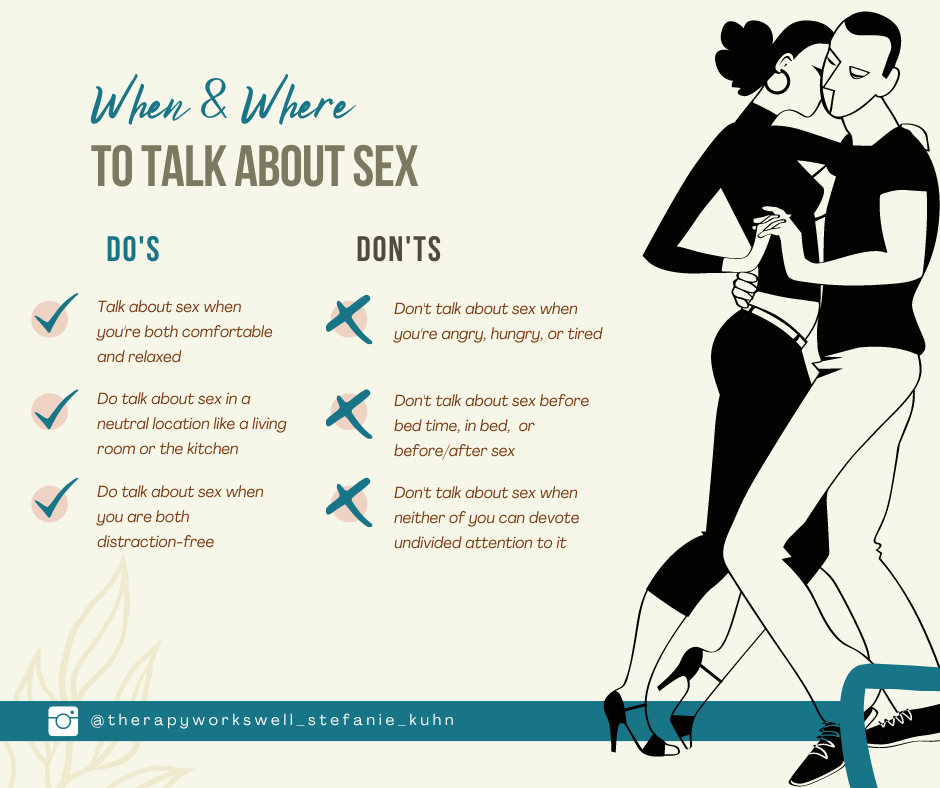Find ways to talk about sex that are appealing to your partner and not a turn off.
In today’s world, sex is an omnipresent topic, be it on TV, in music, or on billboards. However, despite its prevalence in the media, discussing sex, particularly sexual intimacy and sex drive, with your partner remains a challenge.
Contrary to popular belief, good sex doesn’t just happen; it requires open communication, effort, and understanding. Sexual intimacy is crucial for a healthy relationship, but effectively expressing your sexual desires and needs isn’t easy. The problem is, failing to communicate about sex may even indicate broader communication issues within the partnership.
There are many reasons why sexual connection doesn’t happen as often or frequently as people wish it would. Before diving into how to talk about sex with your partner, you want to understand the landscape you’re dealing with. Because the truth is, bringing up sex to someone who is fundamentally not interested usually goes nowhere and leads to deeper resentment and frustration.

When Your Partner Doesn’t Seem Interested In Sex
It can feel frustrating and confusing when your partner seems disinterested in sex, but it’s important to remember that a lack of interest doesn’t always mean they don’t love or find you attractive. There can be several reasons behind this change, including low libido or mismatched libidos between you and your partner.
Knowing about these potential causes can help you approach the situation with empathy and create a plan for how to address it.
Low Libido
Low libido is one of the most common reasons a partner may not seem interested in sex. It refers to a decreased desire to engage in sexual activities, which can happen for a variety of reasons. Stress, hormonal changes, medical conditions, and even medications can all play a role in reducing someone’s sex drive.
It’s important to remember that low libido is not a reflection of your relationship, but something that can be addressed through open communication, lifestyle adjustments, and sometimes medical treatment.
Mismatched Libido
Mismatched libido happens when one partner has a higher or lower sex drive than the other. This is extremely common in relationships and can lead to frustration or feelings of rejection if not handled properly. However, it doesn’t mean your relationship is doomed. Many couples with mismatched libidos successfully navigate this challenge through compromise, open dialogue, and understanding each other’s needs.
Talk about sex with your partner to find ways to balance each other’s desires and create a healthy, fulfilling sex life that works for both of you.
Inhibited Sexual Desire
Inhibited sexual desire (ISD) (more commonly known as Hypoactive Sexual Desire Disorder) can be a factor for some, and consulting a sex therapist can provide valuable insights. By engaging in healthy conversations about sex, your relationship can reap emotional and psychological benefits, ultimately enhancing the sexual intimacy and satisfaction shared between you and your partner.If any of these factors are affecting your sex drive or your partner’s sex drive, this is a good reason to seek out sex therapy. If you’re in the state of Texas I offer virtual services and in-person sessions in the Houston metropolitan area. Please reach out to me for a consultation to see how we can work together and improve your sex life.
If there is nothing amiss with your partner’s libido or sex drive, it’s easier to explore talking about sex as a way to increase the amount of sex you have.
Types of Conversations about Sex
The intimate conversations I’m talking about don’t solely revolve around discussing your personal preferences and boundaries. Of course, improving physical pleasure is important (and fun), but so is fostering a deep emotional connection with your partner.
These discussions encompass lots of different topics, not just pleasure and where you do and don’t want to be touched. By engaging in these intimate conversations, you can nurture a stronger emotional bond within your relationship, ultimately leading to a more satisfying and fulfilling intimate partnership. Other topics include:

- Sexual Exploration and Fantasies: how can each of you expand the depth of your sexual relationship through fantasies and your deepest designs?
- Frequency of Sex: how often would you like to have sex with each other?
- Working through Pleasuring Differences: is there a polite way of telling your partner you like something or don’t want to do something without killing the mood? (Spoiler alert: YES!)
- Sexual Health: what are past sexual experiences or partnerships that you may need to address with each other?
- Blockers and Turn-offs: is there anything that will completely shut down the act of sexual intimacy? What makes you turn off completely from having sex?
- Arousal and Turn-ons: what needs to happen to get you in the mood? Is there a place you like to be touched that will almost-always turn you on?
- Feelings about sex: do you equate sex with love? Does a sexual relationship feel awkward when you talk about it? Were you raised to think sex was natural or dirty?
While pleasure is one goal, there’s more to having a great sex life with your partner than just talking about the pleasure sex brings you. When you talk about difficult subjects, you create a space that fosters intimacy and brings you closer. Talking about sex together can have the same effect. Plus, it can help you both understand how to improve your sexual experiences while increasing intimacy because you connect on a different level as a couple.
The best part of talking to your partner about sex is that it can also be a turn-on in many ways. But, if you get to a stage where speaking to your partner about your sex drive is challenging, consider sex therapy where you can work through your blockers together.
Starting the Sexual Conversation with Your Partner
Take a deep breath – we’re about to dive into some ways to broach the conversation with your partner. If you have a hard time talking about difficult topics with your partner, try doing it as a game. Love Lingual is a great way to connect with your partner on a deeper level (not just sexually). The game comes with five categories – one of which is intimacy. You take turns with your partner asking questions like, “What part of my body turns you on the most?” It’s a great way to start talking in a non-intimidating way.
Another way to initiate a conversation about sex is to unpack what you see on TV or in the movies right when it happens. If you’re watching a movie together and something turns you on – say something and explain what about it turns you on! Conversely, if something turns you off – talk about that, too, and explain why it makes you uncomfortable.
But sometimes the best way to broach the conversation is to just talk about it when you’re alone. You can either schedule time to talk or talk about it when you’re both together without distractions. Talking about this while making dinner or when the kids are buzzing around isn’t the right time. But when you’re both watching TV and playing with your phones – turn it all off and talk to each other.
Tips for Talking about Sex with Your Partner
Having a conversation about sex with your partner can feel awkward, but it’s essential for maintaining a healthy relationship. If you’re noticing a change in your sex life or you have concerns about your intimacy, the best way to address it is by talking openly. With some well-laid plans, discussing physical intimacy doesn’t have to be uncomfortable or tense. Here are some tips to make that conversation easier and more meaningful.
When you talk about sex with your partner, the setting and timing matter a lot. Avoid bringing up the subject in the middle of an argument or during a rushed moment. Choose a time when both of you are relaxed and can focus on the conversation. A private, comfortable space—such as at home during a quiet evening—can make both of you feel more at ease and open to talking about your sexual needs and concerns.
It’s crucial to begin your conversation on a positive note. Instead of diving straight into what’s wrong or what you’re unhappy with, start by acknowledging the things that are going well in your relationship. Compliment your partner on the things they do right and express your appreciation for them. This creates a safe and encouraging environment where both partners feel less defensive and more willing to listen.
When you talk about sex, it’s important to be open and honest about your feelings and needs. Try not to hold back or sugarcoat how you feel, but also be mindful of how you frame your words. Focus on how you feel, rather than placing blame on your partner. For example, you could say, “I’ve been feeling disconnected lately and I think it’s affecting our intimacy,” instead of “You never seem interested in sex anymore.”
Talking about sex can be a delicate subject for many people, so it’s essential to be patient with your partner. They may need time to process what you’re saying or might not have an immediate response. Give them the space to reflect and share their thoughts without pushing for answers. This patience helps create a space for meaningful dialogue and encourages your partner to open up in their own time.
One of the biggest mistakes couples make is waiting until there’s a major problem to talk about sex. Instead, aim to make conversations about your sex life a regular part of your relationship. This doesn’t mean you need to sit down for a deep discussion every week, but checking in with each other about your needs, desires, and how you’re feeling can help keep your connection strong and prevent issues from building up over time. The more you talk about sex, the easier these conversations will become, and the better your relationship will be for it.
Sexual Conversations With Your Partner + Dirty Talk
After starting your conversation, you can let the conversation move along naturally or you could add in some of these questions to dive deeper:
- If I want to initiate sex, what’s the best way to get you in the mood?
- What’s the worst sexual experience you’ve ever had with someone?
- Is there a specific move or action I do when we’re intimate that you LOVE?
- I like it when you whisper dirty things in my ear – does dirty talk turn you on?
- Do you have any sexual fantasies?
- How can we improve our sexual intimacy?
- What are your thoughts on masturbation?
- How has your upbringing impacted your view on sex?
- Is there something I might do that would immediately turn you off from having sex with me?
- Where is your favorite place to be touched?
When you want to get the ball-rolling and move toward an emotionally-charged sexual experience, try a game of “Would You Rather” and include some of these questions:
Would you rather…
- Give or receive oral sex?
- Have a quickie or go for an hours-long session?
- Talk dirty with me or express it with our bodies?
- Have sex in a car or a bathroom?
- Have morning sex or night time sex?
- Try rope play or role play?
- Know my romantic fantasy or tell me yours?
- Have kinky sex or romantic sex?
Since communication is the key to having great sex with your partner, talking dirty is a great way to communicate what you want and need your partner to do! It helps them know emphatically in the moment that what they are doing is what you want. It can be fun and empowering while helping you have more meaningful sex.
When it comes to talking dirty, there are some phrases we say while in the act that we don’t realize fall into the bucket of “dirty talk,” like:
- Telling your partner “Yes! Don’t Stop!” and “That feels so good, right there!” is a great way to communicate that you enjoy what they are doing. Give yourself carte blanche to be as specific as possible because it’ll lead to more consistent sexual satisfaction.
- Stating, “Tell me what you want me to do to you” can be very powerful for your partner because it hands over the reins of control while allowing your partner to verbalize what they know feels good to them.
- When you can hear your partner’s moans, ask, “How does this feel?” It can help your partner guide you with their response and validate that what you’re doing feels good.

Navigating Differences in How You Talk about Physical Intimacy
When it comes to sex and inhibited sexual desire (ISD), no two people are alike which means how you and your partner speak to each other about sex will vary. Remember: there isn’t one “right” way to be sexual and there isn’t a one-size-fits-all approach – differences will happen as you talk.
It’s OK to disagree on different areas of sex but you don’t want your differences to result in ultimatums. And, sometimes, you need help from a neutral third-party like a therapist who specializes in sexual counseling for couples because they can guide the conversation about ISD where both of you benefit. Sex therapy can feel similar to couples therapy but it’s designed to help both individuals and couples work through any psychological, medical, or personal issues that impact and inhibit sexual satisfaction.
When Is The Best Time To Seek Help From A Sex Therapist?
The best time for couples to start seeing a sex therapist is when they notice persistent issues or difficulties in their intimate relationship. Some common signs that it might be time to seek help from a couples therapist or sex therapist include:
- Recurring arguments or misunderstandings about sexual needs and desires.
- Difficulty communicating openly about intimacy.
- Changes in sexual desire or function that are causing distress.
- Traumatic experiences that affect the sexual relationship.
- An inability to reach mutual satisfaction during sexual encounters.
The number of sessions needed with a sex therapist can vary depending on the couple’s specific situation and goals. Generally, couples can expect to attend weekly sessions for a period of 3-6 months, with some couples needing more or less time depending on their progress. The therapist will work with the couple to determine the appropriate length of treatment and make adjustments as needed.
Open and honest communication about sexual intimacy can lead to deeper connections, increased pleasure, and a more fulfilling relationship for both partners. While discussing sex can be challenging, it’s crucial to address any underlying issues or insecurities to work towards a more satisfying sex life.
Remember, good sex doesn’t just happen; it requires effort, understanding, and vulnerability from both partners. By creating a safe space for these conversations, you can foster a stronger bond, deepen intimacy, and ensure your sexual experiences are enjoyable and rewarding.
Are you and your partner struggling with discussing sex or experiencing difficulties in the bedroom? I am here to help. My Texas-based therapy practice can support you and your partner whether you can come into my office or we meet in person.
Together we can discuss how to foster open communication about sexual intimacy, address low libido and mismatched libidos, and provide sex therapy to overcome barriers together. Don’t let intimacy issues hold you back any longer – reach out and start your journey towards a better sex life today!
Improve Your Sex Life With Your Partner Today
Talking about sex with your partner isn’t easy for everyone. Sex therapy can help – reach out for a consultation to learn how.




